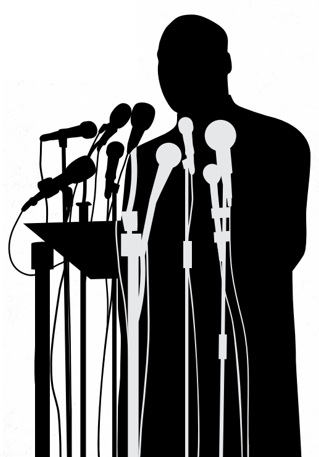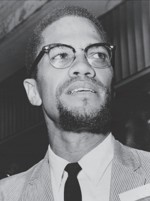
Think about the following questions.
1. Who are some of the most admired people in your country's history? Why?
2. What is Martin Luther King, Jr., famous for?
3. What was the "dream" that he spoke about in this famous speech?
VOCABULARY PREVIEW
Match each New Academic Word List(NAWL) word with the correct definition.
- constitution
- character _____
- slave _____
- republic _____
- physical _____
- discrimination _____
- a. someone who is legally owned by another person and is forced to work without pay
- b. a country that is governed by elected representatives and by an elected leader rather than by a king or queen
- c. unfairly treating a person or group of people differently from others
- d. a document describing the system of beliefs and laws by which a country is governed
- e. the mental and moral traits that make a person an individual
- f. relating to the body rather than the mind
"I HAVE A DREAM" BY MARTIN LUTHER KING, JR.
[excerpted and adapted]

One hundred years ago, Lincoln signed a law that gave freedom to all slaves in the United States. But one hundred years later, the Negro1 is still not free. One hundred years later, the life of the Negro is still sadly chained by segregation2 and discrimination. When the creators of our vast republic wrote the magnificent words of the Declaration of Independence and the Constitution, they were making a promise to all of their children. This promise was that all men would be guaranteed the rights of life, liberty, and the pursuit of happiness. It is clear today that America has not kept her promise as far as her citizens of color are concerned.
Nineteen sixty-three is not an end, but a beginning. Those who hope that the Negro just needed to blow off steam3 and will now be content will have a rude awakening4 if the nation returns to doing things the way they have always been done.
There will be neither rest nor peace in America until the Negro is given his rights as a citizen. But there is something that I must say to my people who stand waiting at the doorway into the palace of justice. In the process of getting our rights, we must not be guilty of wrongful acts. We must not allow our protest to fall into violence. Again and again we must rise to the challenge of meeting physical force with soul force. Go back to Mississippi. Go back to Alabama. Go back to Georgia. Go back to the ghettos5 of our northern cities, knowing that somehow this situation can and will be changed.
In spite of the difficulties of the moment, I still have a dream. I have a dream that one day this nation will rise up and live out the true meaning of its creed6: that all men are created equal. I have a dream that my four children will one day live in a nation where they will not be judged by the color of their skin but by the content of their character. I have a dream that one day in the state of Alabama little black boys and little black girls will be able to join hands with little white boys and little white girls and walk together as sisters and brothers.
This is our hope. This is the faith with which I return to the South. With this faith we will be able to stand up for freedom together, knowing that we will be free one day. This will be the day when all of God's children will be able to sing with new meaning, "My country, 'tis of thee, sweet land of liberty, of thee I sing. Land where my fathers died, land of the Pilgrims'7 pride. From every mountainside, let freedom ring."
And if America is to be a great nation, this must become true. So let freedom ring from the hilltops of New Hampshire. Let freedom ring from the mighty mountains of New York. Let freedom ring from the peaks8 of California! Let freedom ring from every hill in Mississippi. When we let freedom ring, we will be able to speed up that day when all of God's children will be able to join hands and sing in the words of the old Negro spiritual9", "Free at last! Free at last! Thank God Almighty, we are free at last!"
New Academic Word List
- Negro 1 : n. an outdated term meaning "African American," now usually considered offensive
- segregation 2 : n. the practice of legally keeping people of different races, religions, etc., separate from each other
- blow off steam 3 : idiom. to do or say something that helps you to get rid of strong feelings or energy
- rude awakening 4 : n. an unpleasant surprise
- ghetto 5 : n. a part of a city where members of a certain group or race live, usually in poor conditions
- creed 6 : n. an idea or set of beliefs that guides the actions of a person or group
- Pilgrim 7 : n. one of the people from England who created the first permanent settlement in New England in 1620
- peak 8 : n. the top of a mountain
- spiritual 9 : n. a religious folk song originally sung by African Americans in the southern US
READING COMPREHENSION
A ‣ Mark each statement as true (T) or false (F) according to the reading.
- King believed that America had broken its promise to black people.
- True
- False
- King believed that the fight for equality was near its end.
- True
- False
- King said that violence is necessary when others use violence.
- True
- False
- King did not have children at the time of this speech.
- True
- False
- King ends with words from an old song.
- True
- False
B ‣ Choose the best answer according to the reading.
- What is the main purpose of the reading?
- a. To prove that black Americans have been treated badly
- b. To encourage Americans to continue the fight for equal rights
- c. To argue that America's promises of equality were dishonest
- d. To congratulate black Americans for achieving freedom
- In paragraph 2, the word content is closest in meaning to _____.
- a. independent
- b. generous
- c. happy
- d. free
- What is the main point of paragraph 3?
- a. Fighting for freedom involves physical danger.
- b. People must pay more attention to the ghettos.
- c. People must remain non-violent and hopeful.
- d. The situation will not change for a long time.
- The word its in paragraph 4 refers to _____.
- a. nation
- b. creed
- c. dream
- d. moment
C ‣ Look for the answers in the reading and write them on the lines.
- What happened one hundred years before this speech?
_____ - How did King hope his children will be judged?
_____
SUMMARY
An introductory sentence for a brief summary of the passage is given below. Choose three more sentences to complete the summary.
First Sentence: King's speech talks about the freedom and rights that all people should have regardless of who they are.
-
- 1 He dreams of a time when there will be no segregation or discrimination in America.
- 2 At the time, some people thought that African Americans were only protesting in order to blow off steam.
- 3 King believes that black people will not have to use violence in fighting for equal rights.
- 4 King has faith that someday all people of color will be treated as equals in the United States.
- 5 Racial discrimination is especially a problem in southern states like Alabama and Georgia.
VOCABULARY PRACTICE
Fill in the blanks with the words in the box. Change the form if necessary.
- discrimination
- slave
- republic
- constitution
- physical
- character
- Since it has a queen, the United Kingdom is not a(n) _____ .
- _____ from Africa were forced to go to the US in order to work on large farms in the South.
- The two friends have many _____ similarities: they are both tall and thin, with long dark hair and dark eyes.
- Women still face _____ in the workplace, but it is not as bad as it was fifty years ago.
- Besides experience and knowledge, people want their leader to have a strong, honest _____ .
- The US _____ states that the president may serve only two four-year terms.
SUPPLEMENTAL READING
Malcolm X: "By Any Means Necessary"

Malcolm X was born Malcolm Little in Nebraska on May 19, 1925. His father died when he was thirteen, and a few years later, he began a life of crime. He was arrested for stealing in 1945 and spent seven years in prison. While there, Malcolm educated himself by reading books. At the urging of two of his brothers, he joined the Nation of Islam. After leaving prison, he became a minister for the Nation of Islam and then an important leader in the African- American civil rights movement. Malcolm took the last name "X" to symbolize his true, unknown African name.
Malcolm X had a different philosophy than that of Martin Luther King. While King wanted black and white people to live together peacefully, Malcolm X at first claimed that black people were superior to white people and that the two races should live separately. Also, while King urged equal civil rights under US law, Malcolm X emphasized equal human rights. He saw the struggle for equality as international and wanted to bring about worldwide change at the United Nations. Whereas King stressed non-violence, Malcolm X said that African Americans should be able to protect themselves "by any means necessary"—including with the use of weapons.
Later in his life, Malcolm X stopped calling whites a race of "devils." He continued, however, to encourage black people to have pride in their heritage, and he continued to advocate violence, if necessary. Malcolm X was shot to death while giving a speech in New York on February 21, 1965.
Fill in the blanks with information from the reading.
- Malcolm X educated himself while he was _____ .
- Unlike King, Malcolm X once believed that blacks and whites should _____.
- Malcolm X never stopped believing that _____ may sometimes be necessary.

Leave a comment
Load more